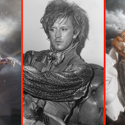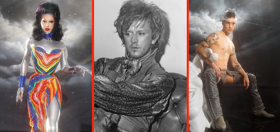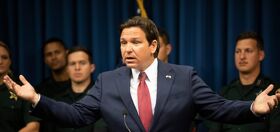 Hugh Dancy is hysterical. The charming Brit—who plays a Victorian-era doctor stumbling upon the key to unlocking female climax in the new comedy Hysteria—toys with double entendres like they’re second nature.
Hugh Dancy is hysterical. The charming Brit—who plays a Victorian-era doctor stumbling upon the key to unlocking female climax in the new comedy Hysteria—toys with double entendres like they’re second nature.
In the film, opening today, Dancy plays Dr. Mortimer Granville, who works with Robert Dalrymple (Jonathan Pryce) to find a cure for “hysteria.” In the 1900s, hysteria was considered an actual medical condition applied to any number of conditions: sexual underactivity or overactivity, depression—even plain-old boredom.
Dalrymple teaches Granville the art of relieving this mysterious malady by essentially bringing their female patients to orgasm. If you think this sounds X-rated, fear not: it was all done in the name of science.
The physicians “attended” to the women with a strange looking contraption, as their patients put their feet in stirrups behind red velvet curtains. The “paroxysms” the women enjoyed were considered completely nonsexual in the Victorian era.
How about we take this to the next level?
Our newsletter is like a refreshing cocktail (or mocktail) of LGBTQ+ entertainment and pop culture, served up with a side of eye-candy.
Strange, yes, but true.
For the 36-year-old Dancy, who’s tackled diverse gay roles in the play The Pride and Showtime’s The Big C, playing such an uptight Victorian prig, didn’t come naturally: At one point, He and Pryce debated how the characters’ technique should be revealed on-screen.
“We had to figure out, like, what’s the angle of approach. What’s going to work best for camera,” he tells Queerty’s Evan Mulvihill. “Jonathan and I had competing theories, which I’m not going to go into. But mine won out, I’m happy to say! We had to approach it as if it was just the most normal thing in the world in order to make the comedy work.”
Below, Dancy submits to our probing about the film, co-star Maggie Gyllenhaal, how gay rights are faring in his native England and more.
Hysteria opens in New York and Los Angeles on May 18, with a wider release in June.
Was it hard to stay serious during some of the movie’s more… intimate scenes?
Basically, the only job for Jonathan [Pryce] and me was to stay serious. Because, actually, that was the whole central joke of the movie. Which is the one truthful realistic part of the movie: that these doctors did not know what they were doing. It was right in front of their eyes and they couldn’t see it. So, yeah, we had to keep a straight face. The set, as a result, was quite fun, because you had to get all of the laughing out of the way in between takes.
How close did you actually get to the ladies’ nether regions?
We agreed during this day of rehearsal, that there needs to be something in there for us to push against, for the sake of realism. Eventually we settled on a sandbag. There’s a lot of sandbags around on a film set. I think it was known as the Modesty Sandbag.
Did you ever feel you were playing a gigolo?
I think that the joke is that he has no idea. He’s good at the job, he’s assiduous and he’s easy on the eyes. So the appointment book starts filling up. And they’re still totally unaware of what they’re doing.
How did you find Maggie Gyllenhaal’s British accent?
Impeccable.
I heard a little Cockney.
It wasn’t Cockney. I think she had more of a contemporary British accent than that very clipped Victorian accent that Jonathan and I had. We went back in time! There’s certain little cheats they made on Maggie’s character. Her costume, they cheated 10 years ahead. On purpose, because she’s progressive.
Speaking of progressive, Pride season is almost upon us. Have you ever been to a Pride parade?
I haven’t, actually, although I was in a play called The Pride. And there’s a kind of constant parade on Christopher Street.
Both President Obama and Prime Minister Cameron have come out in support of marriage equality. Which country do you think will get it first?
I don’t know how it polls in England. The thing is, in England, we don’t have state rights in the same way. We don’t have that hurdle to get over. Maybe it’ll go to the Supreme Court in the U.S., though. Government works so very differently that it’s hard to say. I don’t think that the current British government is going to bring it forward in England at all. Now that [the Conservative Party] lost their local elections recently. Cameron’s not going to risk pissing off his base. So I don’t know.
This movie is about sexuality, as is the Broadway show you’re currently in, Venus in Furs. Have these roles given you any insight on sex and sexuality?
I think they’re really really different beasts: This movie, I’m going to say, no, not really. Although it’s about my character’s liberation, it’s more of an intellectual realization that he has than any personal, sexual liberation. The tone is very light, very easygoing. The play is kind of a play of ideas dressed up as a play about sex. To quote Prince, “this thing about the body is about the mind.” It’s a very heady version of sexual desire. And that’s interesting, I’ve enjoyed talking about that with the other people in the play, but it’s not led to any kind of personal epiphanies.
We’re living nearly a century after Hysteria takes place but some of these issues are still debated today.
It’s very weird, to me, that this movie’s subject matter has suddenly become semi-relevant. We thought that these things had been put to bed, so to speak. Turns out, far from it.
Which things?
I mean, a woman’s right to enjoy sex. The Sandra Fluke thing. And behind that, you’ve got Congress, their panel talking about supposedly women’s health without talking to a single woman. We’re missing something here, I just can’t put my finger on it, so to speak. [Laughs]
It’s impossible to talk about this movie without immediately falling into terrible double entendres!




















Mr. Enemabag Jones
I’m sorry, but why is this on a gay blog? Hugh Dancy is straight, playing a character in a straight film. I don’t get it.
flechesbleues
@Mr. Enemabag Jones: If it’s any help – Rupert Everett is also in the movie, and the director is (I believe) a lesbian. Better?
(it’s also just a really good/funny film)
Lefty
It’s on a gay blog because HE’S GORGEOUS!!
Eric in Chicago
How come no questions about playing a Gay Man on THE BIG C – he had a major part. His character was into Bears. grrrrr
Stupid
He is dreamy. Claire Danes is one lucky ho.
Bob
He was wonderful and heartbreaking on “The Big C”.
Lefty
He also played Ben Whishaw’s boyfriend in (the play) The Pride.
Lefty
@Lefty: which was already mentioned in the article [face-palm]
shannon
THERE IS ————NOTHING———- GORGEOUS BOUT THIS ODD….BIRD LOOKING ASS MAN……..
Clay Andrew Poupart
New comedy? Are you got in a time warp? “Hysteria” came out years ago.
Robbie Morgan
This article was published in May 2012. I think it’s supposed to be a throwback thing or ‘one from the archives’.